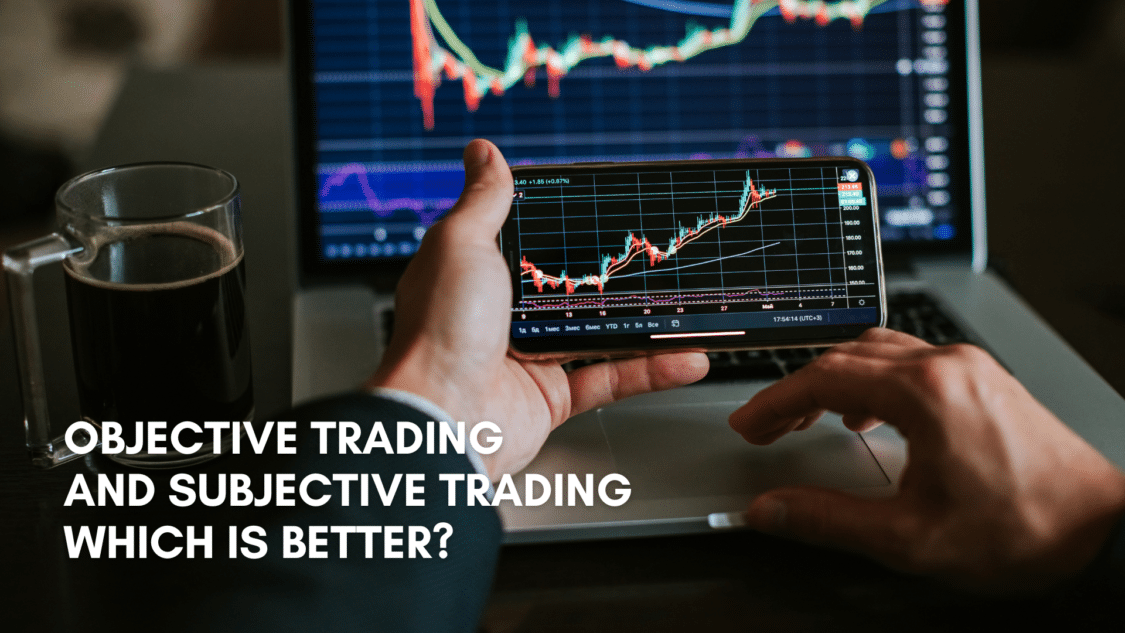In today’s article, we’ll learn about objective and subjective trading. In short objective traders will usually follow a series of rules that guide them through their trading journey and decision-making process. These traders typically plan their buy and sell decisions in advance.

Subjective traders, on the other hand, don’t follow a guide. They are flexible with the market conditions and adapt to what comes their way. They base their choices on what they believe to be true of each given trading opportunity. In contrast to objective traders, subjective traders tend to be more vulnerable to behavioural finance biases and usually go forth by emotion, not reason.
Let’s go more into depth on Objective Trading and Subjective Trading.
Objective Trading:
This form of trading is also commonly referred to as rule-based trading. It is the simplest trading method because of the set of rules the traders go according to. It serves as a guide for the trader, including a trade entry-exit time frame, order types, and other information.

The trader waits until his requirements for initiating a deal are met. He enters a market position, then enters “take profit” and “stop-loss” orders to control his ultimate withdrawal from the transaction. After that, it’s just letting the transaction do its work. When his stop-loss order is activated, it either meets his profit objective or is removed from the trade. This method of trading is usually the most ideal for new traders. Providing the trader with rules reduces the stress for a trader with trading experience.
Subjective Trading:
Subjective trading is a method more relevant for traders with experience. Experienced traders are usually more familiar with the market and its price action. It is more than just trading based on emotions. They make trading judgments based on objective market analysis. They do not follow a rule book. Instead, they evaluate each trading opportunity with the most recent price action and their feeling of the market from all their years of experience.
What are the advantages and disadvantages of both methods of trading?
Objective Trading:
Advantages:
- Minimizes Emotional Biases: It is focused on predetermined rules and criteria, minimizing the influence of emotions on trading choices.
- Consistency: It follows a systematic approach. Applying a systematic method results in consistent choices and could lead to more dependable results.
- Backtesting and Optimization: Traders can evaluate the effectiveness of their trading strategies beforehand by backtesting and optimizing them using past data, enabling them to implement the most suitable ones while trading in real time.
- Removes Guesswork: A systematic approach removes speculation and uncertainty from decision-making by implementing well-defined regulations and standards.
Disadvantages:
- Less Flexibility: Objective trading may be less adaptable to fluctuating market conditions that require quick decision-making or adjustments.
- Reliance on Historical Data: Reliance on historical data for backtesting and optimization purposes may not always be a precise indicator of future market behaviour.
- Market Sentiment: Trading solely based on predetermined rules may fail to accurately reflect the sentiments of the market or account for unexpected events.
- Potential for Over-Optimization: Excessive modification and refinement of objective trading strategies may give rise to the problem of curve-fitting, wherein strategies exhibit excellent performance on past data but face challenges when implemented in real-time trading scenarios.
Subjective Trading:
Advantages:
- Flexibility and Adaptability: It enables quick adjustments and decision-making based on changing market conditions, news events, or personal judgment.
- Intuition and Experience: Subjective trading considers traders’ intuition, experience, and insights, which can be beneficial in certain market situations.
- Market Sentiment: It empowers traders to assess market sentiment and respond accordingly, potentially identifying one-of-a-kind trading opportunities.
- Creative Strategies: Subjective trading allows for developing unique, innovative trading strategies that strict objective rules may not capture.
Disadvantages:
- Emotional Bias: Emotions can influence subjective trading leading to impulsive or irrational decision-making.
- Lack of Consistency: It may lack a set of rules and criteria, making evaluating performance or replicating successful trades challenging.
- Confirmation Bias: Traders may become a victim of confirmation bias, seeking information that supports their subjective views and overlooking other evidence.
- Difficulties in Backtesting: Subjective trading strategies may take a lot of work to backtest or evaluate appropriately due to the reliance on personal judgment and intuition.
Which trading approach, objective or subjective, is suitable for different types of traders based on their experience, risk tolerance, and goals?
- Beginner Traders can benefit from Objective trading because it suits those who prefer a structured and rule-based approach. This trading method provides clear guidelines and risk management strategies, helping lower emotional decision-making and minimize potential losses. Beginners can benefit from learning and implementing objective trading systems to gain a solid foundation in trading.
- Experienced and Disciplined Traders: Subjective trading may appeal more to professional traders with strong analytical skills, market intuition, and the ability to adapt quickly to changing market conditions. Subjective trading enables greater flexibility and discretion in decision-making, which can be advantageous for experienced traders who have gained experience over time.
- High-Risk Traders: Subjective trading may be best for traders willing to take calculated risks and potentially gain higher returns. Success in the financial markets involves risk tolerance and the capacity to promptly make strategic decisions informed by quick market observations and pattern recognition. Traders who derive satisfaction and stimulation from the dynamic and intricate nature of active trading may prefer subjective approaches.
- Long-Term Investors: Using objective trading methodologies, such as trend-following systems or passive index investing, could be more appropriate for investors with long-term investments. These methods prioritize the identification of enduring patterns in market behaviour. Their ultimate objective is to capture enduring market movements that align with the investment objectives of individuals who seek reliable, consistent returns over extended time horizons.
- Active and Day Traders: Both objective and subjective approaches can be used by active and day traders. Objective trading systems can provide structure and efficiency, while subjective methods enable quick decision-making based on market dynamics and intraday patterns.
What are the challenges that come along with subjective and objective trading?
Objective Trading Challenges: One challenge associated with objective trading is ensuring precise and timely trade execution. The flawless execution of mechanical tasks, including order routing and connectivity, is essential. Successfully navigating varying market conditions and avoiding excessive optimization pose additional hurdles, as does effectively handling misleading signals from technical indicators.
Subjective Trading Challenges: Subjective trading brings challenges related to emotional bias and decision-making influenced by feelings like fear or greed. It is fundamental to constantly improve one’s skills, particularly in analyzing the market and comprehending shifts and patterns. Subjective traders encounter difficulties effectively managing risk and adhering to their trading plans.
Both objective and subjective trading requires traders to overcome these challenges through education, practice, and a disciplined approach to trading.
How do objective and subjective traders assess and manage risk in their trading strategies?
Objective traders assess and manage risk in their trading strategies using systematic rules, predefined risk management strategies, and quantitative analysis. Their risk management approach is consistent due to their reliance on data-driven models, predefined risk levels, and risk-reward ratios to counteract emotional biases.
On the contrary, subjective traders evaluate and handle potential risks based on their instincts and personalized methods. Their assessment of risk factors is based on their expertise, understanding of market dynamics, and thorough qualitative analysis. Risk management decisions of subjective traders are influenced by their personal judgment, instincts, and a blend of qualitative aspects like market sentiment and technical analysis.
Both objective and subjective traders strive to manage risk, but their approaches differ.
Conclusion – Objective Trading and Subjective Trading:

Therefore, there is no right or incorrect trading strategy. It is merely which one works for you with the amount of experience you hold. Objective trading is best for beginners, providing a structured, systematic framework for navigating the markets. The predefined rules and criteria help minimize the impact of emotions and biases, allowing traders to make more rational decisions. On the other hand, subjective trading depends on the trader’s skill, intuition, and experience, achieved over years of practice and observation. Subjective traders can respond to shifting market conditions and consider their particular insights when making decisions.
Subjective traders can respond to shifting market conditions and consider their particular insights when making decisions. Finding a trading method that suits your personality, aligns with your trading goals, and enables you to execute trades confidently. Finding the most suitable method for you may require patience and trial and error. Remember that success in trading requires constant knowledge and skills, and objective and subjective approaches to trading can present viable avenues for expanding one’s expertise and achieving financial gains within the markets.
For more news updates, visit our homepage now and see our latest news article. Want to learn more about trading? Visit our education page now and learn for FREE!

